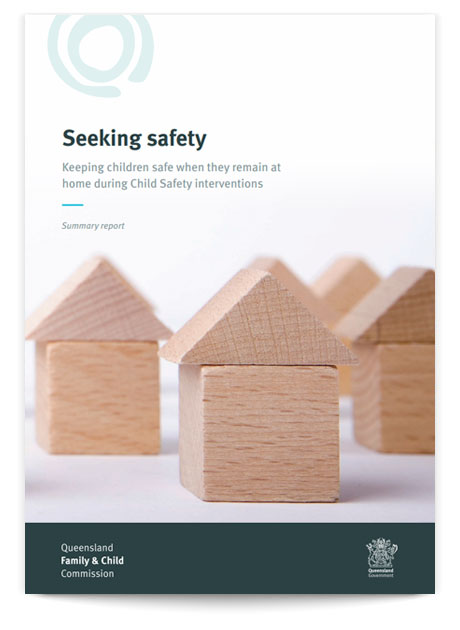- Home
- Sector
- Child Death
- ...
- System reviews after a child death
We have led several systemic reviews in response to the death or serious harm of children known to the child protection system. These reviews were requested by the responsible minister.
We acknowledge the tragic deaths and harm of these children, and the grief experienced by their families, friends, communities and the professionals who worked with them. Their experiences raised concerns around the gaps in a system designed to protect vulnerable children and opportunities for strengthened responses.
The Commission made recommendations to government to improve the child protection system in response to the findings from its reviews. Many of these have already been implemented or are underway. We continue to work with agencies to monitor the implementation of recommendations.
The following reports outline our findings and recommendations.

Seeking safety
This report summarises our findings from a review into how the system meets the protection and care needs of children on Intervention with Parental Agreements (IPA). It does not identify individuals.
The review highlights challenges for meeting the needs of vulnerable children and their families when there are complex family support needs, compounded by parental ice use. It raised concerns about case plans not always being developed quickly enough to guide IPA, know when it is safe to close the intervention and to hold parents to account during the IPA. Keeping families engaged with support services and sharing information across the system to keep children safe continues to be a challenge. The report raises opportunities to strengthen this between Child Safety and Queensland Health. The negative impact of assumptions made by agencies about the motivations of a reporter meant concerns were not always taken as seriously as required.
The review report made three recommendations for government consideration. We have completed Recommendation 2 - to conduct a review into the safety of children on IPA. Read the Intervention with Parental Agreement report here.
Following the disappearance and subsequent death of Tiahleigh Palmer in November 2015, the Commission was asked to conduct a whole-of-government systems review.
The report When a child is missing: Remembering Tiahleigh – A report into Queensland's children missing from out-of-home care summarised the review’s findings and made 29 recommendations to achieve whole-of-government system improvements in responding to children missing from out-of-home care. The recommendations were designed to provide quality systems and improved responses through revised policies and procedures, a cultural shift across agencies, enhanced media campaigns and improved information sharing between agencies.
Post implementation review
In September 2019, the Commission completed a post-implementation review of When a child is missing, working with the agencies who received recommendations from the original report.
The Commission found all recommendations had been addressed. The post-implementation review report identifies some areas where additional work on process and practice would improve the lives of children living in residential care facilities.
Recommendation 28 Supplementary Review
Recommendation 28 of the When a child is missing report required the Commission to conduct a supplementary review of information sharing in Queensland. Focusing on regulated home-based service environments, the Recommendation 28 - Supplementary Review report makes 17 recommendations to improve information sharing and develop stronger safeguards for children.
The recommendations suggest changes to legislation, policies and procedures to:
- increase visibility of home-based services to support regulation and monitoring
- improve information sharing between agencies about potential risks to children so that we can respond earlier
- strengthen processes for assessing the suitability of individuals who provide services to children from their home.
Following the death of Tiahleigh Palmer (When a child is missing: Remembering Tiahleigh – A report into Queensland’s children missing from out-of-home care), the Premier requested a comprehensive examination of the blue card and foster care services in Queensland.
Principal Commissioner Cheryl Vardon led an expert panel to deliver this review. The Commission was asked to pay particular attention to the use of, and reliance on, Working with Children Checks (blue cards) and other information in the assessment and approval process for foster carers in Queensland.
In addition, under the Terms of Reference, a separate review was conducted to address capacity issues and pressure points in the child safety system.
Review of the blue card system report
Queensland’s blue card system has always been one of the strongest in Australia.
The review found that while the blue card system is a strong foundation for creating safe environments for children, it could be stronger and more efficient. The Review of the blue card system report makes 81 recommendations that will introduce significant changes to the blue card system.
The recommendations are intended to strengthen and streamline the blue card system. They will also build capacity of, and support for, organisations and people involved in it. Ultimately, Queensland’s children will be safer doing activities that help them grow, learn and develop.
Review of the foster care system report
In Queensland, the process for being approved as a foster or kinship carer is rigorous. However, we can learn from experience and we can improve.
In conducting this review, the Commission consulted with people and groups with expertise and interest in the foster care system including carers, children with a current or previous care experience and government and non-government agencies, and undertook broader community consultations.
The Review of the foster care system report makes 42 recommendations that will introduce a number of changes to the foster care system. The recommendations are intended to strengthen carer assessment, approval and renewal processes, and the safeguards for children in care. They will also help to build and maintain the public’s confidence in the foster care system.
Ultimately, they will make sure that Queensland’s most vulnerable children will be provided with safe and supportive homes by a system that works together to give children the best possible future.
Strengthening capacity across Queensland’s Child Protection System report
Linda Apelt, a member of the expert panel, was asked to undertake a review of child safety services to determine whether it was operating effectively, and to determine any capacity issues or pressure points which may impact the safety needs of children in the child protection system.
The Strengthening capacity across Queensland’s Child Protection System report presents a six-point action plan focused on funding, staffing, court reforms, non-government services, collaboration and change management.
On 11 June 2016, 21-month-old Mason Jet Lee, a child known to Child Safety Services, died in the north Brisbane suburb of Caboolture.
The Commission worked with Child Safety Services and Queensland Health to ensure their reviews were timely, thorough and able to deliver outcomes to improve service delivery to vulnerable children in Queensland. Both departments provided copies of their internal and external review reports to us for analysis and consideration.
Our analysis of these reviews is detailed in the report A systems review of individual agency findings following the death of a child. We identified opportunities for the child protection system and child death review mechanisms adopted in Queensland to be strengthened and improved.
A contemporary, best practice child death review model for Queensland has been established and commenced operations on 1 July 2020. Find out more information here.
The report Keeping school-aged children with disability safe summarises the Commission's findings from a review into how the system meets the protection and disability support needs of children at risk of harm. It does not identify any individual child.
This review highlighted challenges for meeting the needs of vulnerable children during COVID-19 when they are often less visible in the community. It also raised concerns about the reliance on parents being able and willing to access and engage with disability services on behalf of their children. The report did not make recommendations but identified areas where further consideration and action is required to strengthen system responses to children with disability.
Last updated
3 November 2023

